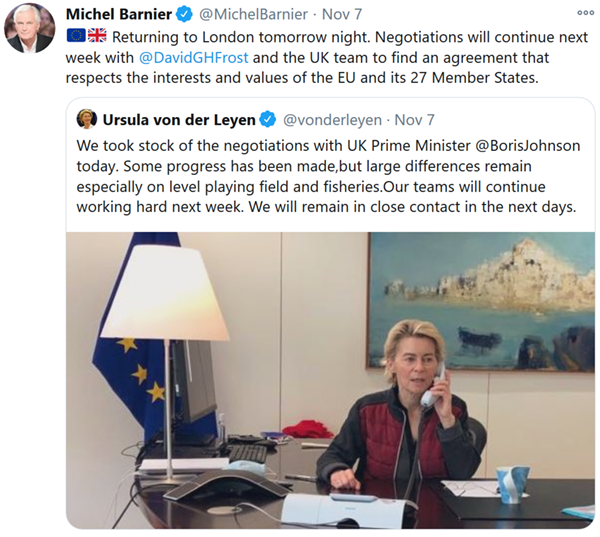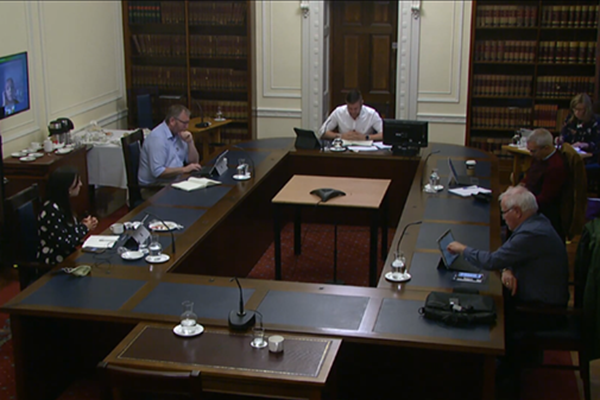Brexit Brief Newsletter
9 November 2020

Introduction
Welcome back to the Brexit Brief. Today negotiations resume in London, while a key vote on the Internal Market Bill takes place in the House of Lords. We consider the latest meeting of the Specialised Committee and evidence given to Committees at the NI Assembly and Westminster on the state of the Irish Sea border, and on policing issues. Finally, we consider what the outcome of the US Presidential election could mean for the Brexit process.
Divergences remain
Talks continue today in London between the UK and EU negotiating teams. This follows a phone call on Saturday between European Commission President Ursula Von der Leyen and UK Prime Minister Boris Johnson: they agreed to remain in close contact, and that while “some progress” has been made, differences remain especially on the level playing field and fisheries.

EU Chief Negotiator Michel Barnier had much the same message for EU Ambassadors and the European Parliament when he updated them last Wednesday, saying there were “very serious divergences” and that the EU is prepared for all scenarios. As such, the EU has published nearly all their readiness notices on the upcoming changes to trade and cross-border exchange with the UK.
Specialised Committee
The Specialised Committee on Ireland/Northern Ireland met on 5 November. According to a UK Government statement, the fourth meeting covered focused on the implementation of the Protocol. Agreement has been found on the process for implementing medicines regulation in Northern Ireland in a phased manner. The process for identifying NI traders for VAT purposes and allowing them to reclaim VAT through current IT databases when trading in goods with the EU has also been established. Outstanding issues include practical solutions for trusted traders such as supermarkets and how to classify ‘at risk’ goods which may enter the EU market.
Internal Market Bill
As talks resume in London, the Internal Market Bill is at Committee Stage where Part 5 of the Bill (which contains the controversial clauses on breaking international law) is being considered. Lords will vote on the Bill and are expected to reject it.
On 5 November the UK Government published a press release entitled ‘Northern Ireland businesses welcome UK Internal Market Bill’. The UK Government says, “On 1 January 2021, powers previously held by the EU, will flow directly back to Stormont, Holyrood and the Senedd thereby giving them greater control and influence than they ever had while the UK was inside the EU. The Bill will protect the Union whilst safeguarding the devolved administrations’ right to regulate as they do now.”
However, the Centre on Constitutional Change contends that the Bill, as it stands, “suggests a significant recentralisation of power”, noting that Westminster would reserve competence over state aid, and gain new spending powers in devolved areas. The rules on mutual recognition and non-discrimination could mean that laws made by a devolved government would have a limited impact.
Preparedness
Councils at the Executive Office Committee
The Committee for The Executive Office heard from Councillors and officials from several Councils. They raised numerous issues affecting their constituencies such as preparedness for the end of the transition period, including SPS checks and resources for this, and no-deal planning. Other issues raised were labelling, increased costs for tourists, consequences of loss of EU funding, and particularly the lack of complete knowledge on what preparations need to be made.

Watch back the Committee for The Executive Office.
Policing and judicial cooperation
The Chief Constable of the PSNI gave evidence last week to the Northern Ireland Affairs Committee, telling MPs that there is a danger that the border could be used to smuggle drugs, guns, and people. He also warned of the implications for security if the UK loses access to the European Arrest Warrant and intelligence. He described the implications for data sharing as moving from “wi-fi to modem”: you will still have connectivity but it will take much longer.
Border controls
The BBC reports that there is a “very high risk” that the Irish Sea border will not be completely operational by the end of the year. This is according to information from the National Audit Office about potential deficiencies in software systems and staffing. Northern Ireland’s Department for Agriculture, Environment and Rural Affairs (DAERA) has said it is taking contingency planning measures to allow operability by 1 January. The NI Assembly Committee for Agriculture, Environment and Rural Affairs was briefed by the Department on 5 November. Officials expect the completion of the full schedule of work by June 2021 and urged the UK and EU to “step up” to make this work.
Shared Prosperity Fund
The Northern Ireland Affairs Committee has written to Secretary of State for Northern Ireland Brandon Lewis about the Shared Prosperity Fund. It says that the UK Government has still not provided substantive detail on how it plans to replace EU Structural and Investment Funds with the Shared Prosperity Fund. The Committee also criticises the lack of engagement by UK Government with stakeholders in Northern Ireland.
British-Irish Council
The 34th British-Irish Council took place virtually on 6 November. While the main topic of discussion was economic recovery from Covid-19, Ministers told the Council of their Brexit-related activities and noted that since the last meeting of the Council, the Northern Ireland Executive has been restored. Ministers welcomed the participation of the Northern Ireland Executive First Minister and deputy First Minister. The next BIC Summit will be held by the Northern Ireland Executive.
US election
The big news of the last week was, of course, the US Presidential election. In the run-up to the election, there was some speculation that Boris Johnson could be waiting for the election result before risking an infamous ‘no-deal’. Some argued that Johnson may believe a US-UK trade deal was more likely with Trump as President.
Many commentators have been weighing into the discussions about what a Biden win could mean for the UK and the Brexit process. Biden has stated that, “any trade deal between the US and UK must be contingent upon respect for the [Good Friday] agreement and preventing the return of a hard border” and has said that the Good Friday Agreement cannot become a “casualty of Brexit”. Previously Biden has expressed a negative view on Brexit, saying that “US interests are diminished with Great Britain not being an integral part of Europe and being able to bring influence”.
Other commentators take a more optimistic view of the situation: Trump’s policy has been ‘America First’ but Biden is keen to rebuild alliances and can be expected to be a ready partner for the UK.
Catch up with the Committees
- 4th November - Committee for Infrastructure - EU Exit Secondary Legislation
- 4th November - Committee for the Executive Office - Councils and City Council members and officials give evidence on Brexit
- 4th November - Committee for Finance - Written Evidence - PEACE PLUS Programme – Update on development
- 4th November - Committee for the Economy - Departmental Written Briefing - EU Exit Legislation
- 5th November - Committee for Health - Food Standards Agency - UK Common Framework; Secondary Legislation relating to EU
- 5th November - Committee for Agriculture, Environment and Rural Affairs - Oral Briefing from DAERA – EU Exit Preparedness
This week at the Assembly
- Wed 11 Nov, 11.20 am - Committee for Infrastructure - Secondary Legislation relating to EU Exit
- Wed 11 Nov, 12 pm - Committee for the Economy - Secondary Legislation relating to EU Exit
- Wed 11 Nov, 2.15 pm - Committee for Finance - European Division and SEUPB: PEACE PLUS programme - Oral Evidence
- Wed 11 Nov, 2 pm - Committee for The Executive Office - Brexit – Evidence from Councils; Brexit - Consideration of Request for Written Evidence from Minister Gove MP
- Thurs 12 Nov, 10 am - Committee for Agriculture, Environment and Rural Affairs - The Greenhouse Gas Emissions Trading Scheme; Written Briefing from DAERA on Legislation relating to EU Exit; Oral Evidence from DAERA



